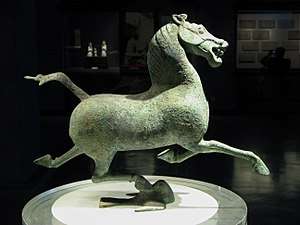Tianma
Tianma (天馬 Tiānmǎ, "heavenly horse") was a winged flying horse in Chinese folklore. It was sometimes depicted as a chimerical features such as dragon scales, and was at times attributed the ability to sweat blood- possibly inspired by the parasite Parafilaria multipapillosa (Schafer, 295 note 19), which infected the highly sought-after Ferghana horsees 大宛馬 sometimes conflated with Tianma.

Flying Horse, East Han Dynasty.Bronze. Gansu Provincial Museum
In the Western Zhou Empire, Tianma referred to a constellation.[1] Tianma is also associated with the Han dynasty emperor Wudi, an aficionado of the Central Asian horse.[2] and the famous poet Li Bo [3]. The bronze statue, Gansu Flying Horse, is a well-known example.
References
- "The Palace Museum: Peking" Wan-go Weng/Yang Boda
- Rutt, Richard (2002). The book of changes (Zhouyi): a Bronze Age document. Routledge. p. 331. ISBN 0-7007-1491-X.
- Kuwayama, George (1997). Chinese ceramics in colonial Mexico. University of Hawaii Press. p. 32. ISBN 0-87587-179-8.
- Wong, Laurence (2019). Thus Burst Hippocrene: Studies in the Olympian Imagination. Cambridge Scholars Publishing. p. 269. ISBN 9781527526150.
- Schafer, Edward H. (1985) The Golden Peaches of Samarkand. Berkeley: University of California Press. ISBN 978-0-520-05462-2.
This article is issued from Wikipedia. The text is licensed under Creative Commons - Attribution - Sharealike. Additional terms may apply for the media files.